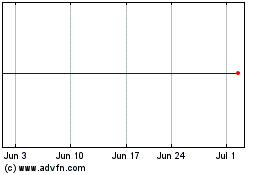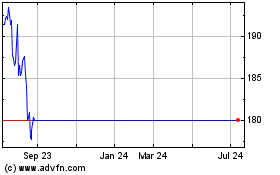Opioid Defendants Air Concerns Ahead of Federal Trial in Ohio
September 25 2019 - 5:19PM
Dow Jones News
By Sara Randazzo
Drugmakers and distributors accused of triggering the opioid
crisis argued Wednesday that a coming trial will unfairly malign
them for running legal businesses and that the trial itself is
shaping up to be unnecessarily chaotic.
The plaintiffs, two Ohio counties, have identified 85 witnesses
and tens of thousands of documents they could present to a jury,
despite having just 100 hours to put on their case, court filings
show.
"Clearly, Plaintiffs are keeping all their options open and
seeking to maintain the element of surprise," Cardinal Health Inc.
wrote in a Wednesday court filing arguing it hasn't been given
enough information to know how to defend itself against claims that
it and other companies conspired to cause widespread opioid
addiction.
Cardinal is among more than half a dozen companies slated to go
on trial late next month in federal court in Cleveland, along with
fellow drug distributors McKesson Corp. and AmerisourceBergen Corp.
and drugmakers Johnson & Johnson and Teva Pharmaceutical
Industries Ltd.
The companies will face off against Ohio's Cuyahoga and Summit
counties, whose cases were selected to go to trial first from
around 2,000 lawsuits filed by cities and counties centralized in
the courtroom of U.S. District Judge Dan Polster.
A Wednesday deadline gave the pharmaceutical companies and
counties a final chance to preview their courtroom plans and ask
the judge to limit what evidence the jury will hear over the
two-month trial.
Johnson & Johnson, which faces a $572 million judgment from
an earlier opioid-crisis trial in Oklahoma, argued in its filing
that while it "fully recognizes the opioid crisis that exists in
this country," the flow of illegal heroin and fentanyl into the
communities is more to blame, not their prescription drugs.
The company also cited "unscrupulous doctors and internet
pharmacies operating as drug-trafficking organizations," the
diversion and abuse of oxycodone and hydrocodone pills, and state
and federal governments that have struggled to balance patient
needs with warnings of abuse.
Other defendants are also seeking to distance themselves from
the problem, arguing they can't be held liable because they
followed federal guidelines around the manufacture and distribution
of the powerful painkillers.
The trial will test legal claims that the companies violated
state and federal conspiracy laws and that the opioid epidemic is a
"public nuisance" caused by the defendants. The counties are
expected to ask for billions of dollars in recovery, which they
said in a Wednesday filing is needed, otherwise "individuals will
continue to misuse and become addicted to opioids at historically
high levels."
Walgreens Boots Alliance Inc., whose Walgreens branch until 2014
operated as a distributor as well as a pharmacy, said the counties
are attempting to conflate evidence against very different types of
companies. "Far from being monolithic, Defendants operated entirely
different businesses occupying different parts of the supply
chain," the company argued.
The landmark trial initially included even more legal claims and
corporate defendants but has been slowly slimmed down at the
request of Judge Polster.
One major target, Purdue Pharma LP, filed for bankruptcy in
recent weeks, which removed it from the trial. Three other
drugmakers, Endo
International PLC, Allergan PLC and Mallinckrodt PLC, reached settlements to avoid the trial, though they continue to face lawsuits from hundreds of other municipalities.
Earlier this week, the two counties still had 150 potential
witnesses, but that list was reduced to 85 on Wednesday, court
filings show. It includes former Drug Enforcement Administration
employees, current and former employees of the drugmakers and
distributors, and experts in areas such as addiction and how best
to craft a plan to reduce opioid overdoses.
Cardinal Health argued Wednesday that the 100 total hours
allotted for all of the defendants to present their defense is so
truncated it violates the company's due process rights.
The companies and plaintiffs presented lists of questions
Wednesday they think should be asked of potential jurors, including
some aimed at rooting out bias against large corporations and
others probing their views on opioid medications. The court has
already dismissed 500 potential jurors based on written
questionnaires, court filings show.
Virtually every state has also filed an opioid-crisis lawsuit,
though those are largely proceeding in state courts and haven't
come under the purview of Judge Polster.
Ohio's attorney general, Dave Yost, is asking an appellate court
to halt next month's trial, arguing the two counties don't have the
authority to bring the claims and that the trial will interfere
with his own lawsuit.
The Sixth U.S. Circuit Court of Appeals on Wednesday ordered the
counties and Judge Polster to respond to the attorney general's
concerns within seven days.
Write to Sara Randazzo at sara.randazzo@wsj.com
(END) Dow Jones Newswires
September 25, 2019 17:04 ET (21:04 GMT)
Copyright (c) 2019 Dow Jones & Company, Inc.
AmerisourceBergen (NYSE:ABC)
Historical Stock Chart
From Mar 2024 to Apr 2024

AmerisourceBergen (NYSE:ABC)
Historical Stock Chart
From Apr 2023 to Apr 2024
